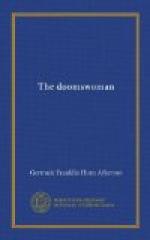He turned his back upon the Mission and rode toward his home, sixty miles in a howling November wind. At Bodega Bay he learned that Governor Rotscheff had passed there two days before with a party of guests that he had gone down to Sausalito to meet. Chonita awaited him in the North. A softer mood pressed through the somberness of his spirit, and the candle of hope burned again. Gold must exist elsewhere in California, and he swore anew that it should yield itself to him. The last miles of his ride lay along the cliffs. Sometimes the steep hills covered with redwoods rose so abruptly from the trail that the undergrowth brushed him as he passed; on the other side but a few inches stood between himself and death amidst the surf pounding on the rocks a thousand feet below. The sea-gulls screamed about his head, the sea-lions barked with the hollow note of consumptives on the outlying rocks. On the horizon was a bank of fog, outlined with the crests and slopes and gulches of the mountain beside him. It sent an advance wrack scudding gracefully across the ocean to puff among the redwoods, capriciously clinging to some, ignoring others. Then came the vast white mountain rushing over the roaring ocean, up the cliffs and into the gloomy forests, blotting the lonely horseman from sight.
He arrived at his house—a big structure of logs—late in the night. His servants came out to meet him, and in a moment a fire leaped in the great fireplace in his library. He lived alone; his parents and brothers were dead, and his sisters married; but the fire made the low long room, covered with bear-skins and lined with books, as cheerful as a bachelor could expect. He found a note from the Princess Helene Rotscheff, the famous wife of the governor, asking him to spend the following week at Fort Ross; but he was so tired that even the image of Chonita was dim; the note barely caused a throb of anticipation. After supper he flung himself on a couch before the fire and slept until morning, then went to bed and slept until afternoon. By that time he was himself again. He sent a vaquero ahead with his evening clothes, and an hour or two later started for Fort Ross, spurring his horse with a lighter heart over the cliffs. His ranchos adjoined the Russian settlement; the journey from his house to the military enclosure was not a long one. He soon rounded the point of a sloping hill and entered the spreading core formed by the mountains receding in a semicircle above the cliffs, and in whose shelter lay Fort Ross. The fort was surrounded by a stockade of redwood beams, bastions in the shape of hexagonal towers at diagonal corners. Cannon, mounted on carriages, were at each of the four entrances, in the middle of the enclosure, and in the bastions. Sentries paced the ramparts with unremitting vigilance.
Within were the long low buildings occupied by the governor and officers, the barracks, and the Russian church, with its belfry and cupola. Beyond was the “town,” a collection of huts accommodating about eight hundred Indians and Siberian convicts, the workingmen of the company. All the buildings were of redwood logs or planed boards, and made a very different picture from the white towns of the South. The curving mountains were sombrous with redwoods, the ocean growled unceasingly.




